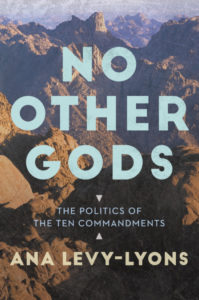Center Street provided me this book for review. This post contains affiliate links to support this site.

What happens when we value individual freedom more than we value community and justice? Author Ana Levy-Lyons argues that in a time of moral relativism we still need social codes to thrive, individually and globally. No Other Gods: The Politics of The Ten Commandments presents Levy-Lyons’s case for the relevance of The Ten Commandments in a modern, global society.
The book opens with a beautiful call to look at the God of the Ten Commandments as a God of liberation, one who brought the Israelites out of Egypt and who cares for the oppressed. Levy-Lyons calls us to examine the cost of truly following no other gods, whether that be a career that calls us to questionable ethics or a self-image that entices us to luxury. The book parallels our own idolization of status symbols with the idols of the ancient Near East, detailing the ceremonies that give each their supposed power.
Levy-Lyons argues compellingly that expanding from close-knit, tribal societies of ancient times to the current connected world means we must take a new perspective on the Ten Commandments. She challenges us to examine how “Thou Shalt Not Kill” looks in an era where we know few of the people our food and clothing choices directly impact. Bearing false witness against a neighbor becomes untruths spread about an entire country or race, and “Thou Shalt Not Steal” means paying a fair price for what we want and need.
I love the portrayal of Sabbath as defiance against enslaving powers of the past and the future. The author encourages us to step outside of economic and cultural systems that demand endless productivity to know that we have enough, just as we are. “Thou Shalt Not Covet” encourages us to create conditions that enable this shift in thinking in ourselves and our families; Levy-Lyons lists several suggestions to cultivate this abundant thinking, and I found myself wishing for an entire book on this subject alone.
Levy-Lyons is at her best in No Other Gods when she refrains from political name-calling and division. While her book unabashedly springs from the far left of the political and theological spectrum, I believe her assertions and scholarly research can provide fruitful discussions for people of all beliefs, and I hate to see her readership limited when she rails against more conservative politics or theology.
Ana Levy-Lyons has great faith in humanity to solve many of the problems it has created, envisioning Earth as a garden of Eden that truly has enough for all. While I come from a different perspective, I appreciate the challenging vision No Other Gods brings to readers as we are called to live bold, faithful, and compassionate lives.
No Other Gods: The Politics of the Ten Commandments was released March 6, 2018, by Center Street, an imprint of Hachette Books.


